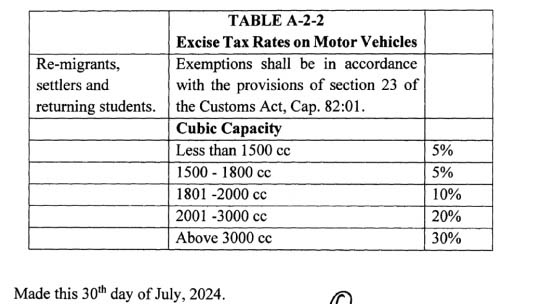-retroactive to September 1st , 2023
A day after a court ruled that a 30% excise tax on remigrants’ vehicles over 3000 cc was unlawful, the state legitimized the tariff by gazetting new regulations and making them retroactive to September 1st, 2023.
According to the new regulations gazetted on July 30th remigrants with vehicles of less than 1800 cc will pay an excise tax of 5%, those between 1801 to 2000 cc 10%, those between 2001 to 3,000 cc 20% and those above 3000 cc 30%.
On July 29th, Chief Justice (ag) Roxane George SC ruled that the imposition of a 30% excise tax on the vehicles of remigrants was unlawful and the inscribed 10% figure should be applied.
Since July, 2023 the Guyana Revenue Authority (GRA) had raised the excise tax payable by remigrants from 10% to 30% on vehicles with engines larger than 3,000cc. Justice George granted an order sought by Adithya Bramdeo declaring that the GRA’s imposition of the excise tax at the rate of 30% was illegal.
On 8th April, 2024, Commissioner-General of the GRA, Godfrey Statia, wrote Basdeo stating that he was required to pay a 30% excise tax on his new generation 2023 Toyota Landcruiser vehicle.
Bramdeo took issue with this and caused his attorney Siand Dhurjon to write the GRA on 15th April, 2024 asserting that the correct excise tax rate was 10%. In Bramdeo’s case the 10% was equivalent to over $1,500,000 but the GRA was insisting that he pay nearly $4,600,000 – a difference of $3,100,000 in the excise tax. The GRA never responded and on 28th May, 2024 Bramdeo caused Dhurjon to sue the GRA.
Dhurjon said that the GRA’s Deputy Commissioner, Gavin Low, responded by saying that regulations of 10th July, 2023 tripled the rate of excise tax payable from 10% to 30%. As such for the last year the GRA was tripling the excise tax payable by re-migrants for vehicles with an engine size of 3,000cc and above and doubling the excise taxes (at the rate of 20%) for vehicles with an engine size above 1,999cc and under 3,000cc.
When the matter came up for hearing before the Chief Justice, Dhurjon said that counsel for the GRA, Nicklin Belgrave, reported that the GRA had made a mistake because it realized that the Minister of Finance had merely signed the regulations of July, 2023 but the regulations were not duly brought into force by being published in the Official Gazette or being tabled in the National Assembly.
Dhurjon said that the Chief Justice granted all of the orders prayed for by Basdeo. He said that she also declared that the GRA’s policy of requiring 30% excise taxes was unlawful and she granted an order of certiorari quashing Statia’s assessment of 30% excise taxes. The judge also granted an order of mandamus to compel the GRA to apply the correct excise tax of 10%. The retroactivity of the July 30 regulations would mean that Bramdeo will still have to pay the 30% excise tax.








